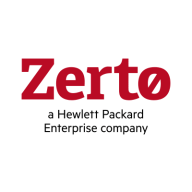

Zerto and Azure Backup are prominent solutions in data protection and disaster recovery. Zerto appears to have the upper hand due to its comprehensive features and customer service responsiveness.
Features: Zerto offers continuous data protection, simplified management of multi-site environments, and comprehensive replication options. Azure Backup provides seamless integration with the Azure ecosystem, automated backup capabilities, and cloud-native functionality.
Room for Improvement: Zerto needs better reporting and alerting capabilities, and more user-friendly updates. Azure Backup requires faster recovery times, more detailed reporting features, and enhanced monitoring tools.
Ease of Deployment and Customer Service: Zerto is known for straightforward deployment and responsive customer service. Azure Backup is easy to deploy within the Azure environment but faces customer service criticisms, making Zerto’s deployment and service more efficient.
Pricing and ROI: Zerto is perceived as expensive but justifies its cost with a strong ROI due to reduced downtime. Azure Backup has a more cost-effective initial setup with a less emphasized ROI impact.
Before, it was a huge cost. It was several thousand dollars to do a DR test, whereas now, I click a button.
The return on investment is evident, as Zerto saves more than 60 percent of time in various operations compared to the previous manual processes.
Most people like me hope we never have to use it. It is like insurance.
I have never had an issue that was not resolved, and I have never been in a situation where they did not respond.
I would give them a rating of ten because it represents the highest level of support based on the technical knowledge of the support team, response time, and effectiveness of the provided resolutions.
We receive support around the clock, which is excellent.
Azure Backup is scalable since it is a global solution.
I would rate it a ten out of ten for scalability.
Customers need to follow good engineering practices for optimal product use.
By adding more hosts and installing VRAs on each, tasks can be efficiently managed.
Azure Backup is stable for Microsoft environments.
I promptly delete the malfunctioning elements and set them up again to resume replication, ensuring stability.
The ease of use was so good with Zerto that they were able to migrate things much quicker.
I consulted with tech support, and we determined the solution was to move the main workload to a resource-available ESX box.
It is not a perfect tool for restoring SQL databases since it requires replacing everything instead of restoring specific files.
The reporting functionality of Azure Backup needs improvement.
If I have 350 objects that I am protecting, I would like Zerto to be able to fire them up in one order, rather than having to manually bring them up in a sequence.
To increase accessibility for small and medium businesses, Zerto should consider a competitive pricing strategy, possibly including subscription-based licensing options.
The main issue with Zerto is its user interface, which lacks flexibility and presents a steep learning curve.
Azure Backup is expensive relative to the value we get from it.
If you want a good-quality tool that is robust and does a good job for you, you have to pay a higher price to get that, and Zerto is no different.
However, it can become quite expensive when you start looking at the number of workloads you have in the environment and what you would like to do.
Zerto is easier to set up and use, and it's less expensive.
The most valuable feature of Azure Backup is its simplicity.
We use the normal features for Azure Backup, specifically to make backups of the VMs.
Zerto offers excellent technical support with responsive and helpful experts.
If we were attacked, I could revert to a backup from five seconds before the attack, and no one would know we were attacked.
The replication time and the minor amount of time it takes to sync a new server outside of any of my huge 40-terabyte boxes is ridiculously quick.


Azure Backup is a scalable backup solution with zero capital investment and minimal operational expenses that can help a company achieve maximal data protection. Azure Backup’s System Center Data Protection Manager provides optional integrations that can enable you to protect both advanced workloads running in your datacenter in VMs as well as those that are on physical servers.
Azure Backup has many features that make it a most effective product. Included among these is its ability to easily scale up your storage capacity. It taps into the cloud to give you the ability to expand on a massive scale. This can be done without any monitoring or maintenance overhead.
Benefits of Azure Backup
Some of the benefits of using Azure Backup include:
Reviews from Real Users
There are a number of characteristics that make Azure Backup extremely effective. Two of these are the flexibility that it offers users and its overall effectiveness.
PeerSpot user Ayman Y., an IT manager at NOMAC, notes all of the different backup options that Azure Backup offers. He writes, “It has many features. First of all, you can schedule a backup for the client as you like. You can do a backup from the whole virtual machine as an image. You can do a backup only from files and folders. It has every option. All options are available for the backup, for the restore, for the bandwidth utilization to do backups, even virtual machines or a physical machine. If you need to do a backup of the whole image from the virtual machine, all these options are there.”
PeerSpot user Muzammil M., a senior operations engineer at the AlGosaibi Group, notes the effectiveness of Azure Backup when he writes, “Azure Backup is good because it is entirelycloud-based, which means that you can be 99.9% sure that your backup is safe. This is the reason that I suggest its use for companies that need to back up critical data.”
Zerto is used for disaster recovery, business continuity, data migration, and ransomware recovery, providing continuous data protection and near real-time replication. Valued for ease of use, efficient failover processes, and versatile integration, it enhances organizational efficiency, reduces errors, and boosts productivity.
We monitor all Backup and Recovery reviews to prevent fraudulent reviews and keep review quality high. We do not post reviews by company employees or direct competitors. We validate each review for authenticity via cross-reference with LinkedIn, and personal follow-up with the reviewer when necessary.